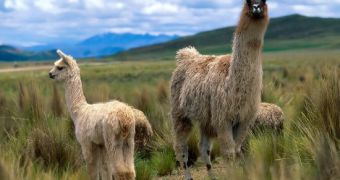In an attempt to keep the country's farmers safe from wolf packs which have gotten into the habit of feeding on sheep, authorities in Sweden are now looking into the possibility of turning a group of llamas into a first line of defense against these predators.
Courtesy of human society's constant need to expand, run-ins between people and wild animals have pretty much become a thing of the day.
Still, the idea of making a group of herbivores keep human communities safe from several rather gifted predators is bound to be a head-turner. Huffington Post reports that Sweden's authorities explain that, should things go as planned, llamas will first and foremost be used to safeguard farmers living in the country's southern county of Skåne.
Thus, during the initial stage of this anti-wolves campaign, four llamas will be allowed to roam free on two large estates located in said part of Sweden.
This trial run is scheduled to make its debut later this month.
Once these four llamas prove that, much like others of their kind, they are fully capable of tackling wolves, more such herbivores are to be introduced to the region.
“We know llamas have had a positive effect against cougars and coyotes in the United States, but there are no proper studies on wolves,” Nils Carlsson, a predatory management expert, told members of the press.
“We know it's not a black-and-white solution, but if it can decrease the number of sheep killed then we're on the right track and can consider rolling out the concept further across the region,” Nils Carlsson went on to argue.
Despite their being herbivores, llamas can put on quite the aggressive show should they feel provoked or threatened in any way.
Although nobody expects them to completely rid the region of wolf packs, authorities believe that their presence will help lower the number of attacks on sheep.
Since this plan does not involve the wolves' being hunted and killed for the sake of farm animals, conservationists are likely to also approve of it.

 14 DAY TRIAL //
14 DAY TRIAL //